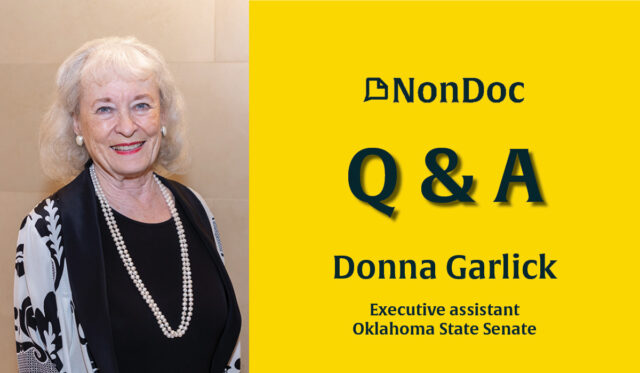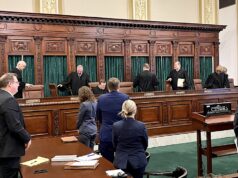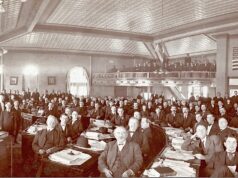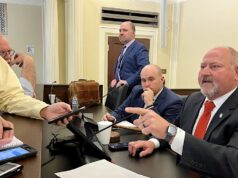

(Update: Underscoring her status as an institution at the Oklahoma State Capitol, longtime executive assistant Donna Garlick was talked out of retirement to work for Sen. Ally Seifried for the 2023 legislative session. The following Q&A remains in its original form from May 2022.)
After 57 years of work at the Oklahoma State Capitol, longtime executive assistant Donna Garlick is retiring. A fixture in the building for more than five decades, Garlick will be leaving the Legislature later this year. As a going-away present, Capitol insiders threw her a party earlier this month. Not to be outdone, legislative leaders decided last week that she should get to experience one more extraordinary session.
The daughter of a liquor bootlegger, Garlick grew up in southern Oklahoma and started working for the Legislature in 1965. At the time, she had no idea all of the political drama and policy turmoil she would witness, nor that she would become the executive assistant whom some would call the most influential non-elected person in the building. Some people would like to see her write a book about her time at the State Capitol.
In the following Q&A, Garlick recalls the legislators for whom she has worked, one of her favorite debates on a controversial bill and lessons she learned as a child. Plus, she offers a little advice to young lawmakers and prospective legislative assistants.
The following answers to questions have been edited lightly for clarity and style.
Where did you grow up, and how did you come to work at the State Capitol?
I was born and raised in Madill, Oklahoma — Marshall County. After high school, my first job for the State of Oklahoma was secretary to the manager of Lake Texoma Lodge. I moved from Madill to Oklahoma City in 1961. In 1965, my friend, Sen. John Massey from Durant, called and asked me if I wanted to come to work at the Oklahoma State Senate. I readily accepted. He was chairman of Administrative Duties and assigned me to work for Sen. Bryce Baggett from OKC. This was one of the longest sessions in history, with the impeachment of a Supreme Court Justice. The sessions occurred every other year back in those days.
Can you tell us all the lawmakers for whom you served as an executive assistant? Who was the most challenging, and who was the most laid back?
In 1967, I worked for Sen. Finis Smith from Tulsa. He ultimately became president pro tempore and served until 1972. My next boss was Sen. Jim Hamilton, from Poteau, who became president pro tempore and he served two years (by choice). Sen. Gene Howard from Tulsa was the next president pro tempore I worked for, and he served from 1975 to 1980. I continued to work for him after he left the pro tem office.
In 1984, Jim Hamilton came out of retirement and ran for the Oklahoma House of Representatives. I went to work for him in the House until he retired in 1998. He was chairman of House Appropriations and Budget for eight of those years.
During the Christmas holidays of 1998, the executive assistant to Sen. Stratton Taylor, Ms. Pete Jacobs, died suddenly, and I was asked to come to work for Sen. Taylor. I had just been hired by Sen. Bob Kerr and worked for him one week before going back to the pro tem office. I worked for Sen. Taylor for the next nine years. Sen. Sean Burrage followed him as my senator for the next eight years and Sen. Marty Quinn for the last eight years.
The most challenging was Sen. Bryce Baggett, probably because I was so new and had so much to learn, and the most laid back was Sen. Gene Howard. All were wonderful to work for, and I learned so much from each one.
Your career spanned five decades, and you had a longer tenure than even Sen. Gene Stipe, whose political influence shaped Oklahoma for a generation. Do you have a particularly memorable story that highlights the complicated legacy of Sen. Stipe?
Sen. Stipe was my good friend, and he nicknamed me “Snow White,” probably because I had black hair and fair skin. I was best friends with his executive assistant, which allowed me to spend a lot of time with them. He would take us to lunch many times, and he was the most benevolent person you could imagine. The thing I remember most about Sen. Stipe was how he took care of his constituents. I was able to witness on more than one occasion when he would be in his law office on Saturdays, and a continual stream of people would come to get advice and assistance. He would not charge them a dime.
What was the most memorable debate on a bill you can recall during your time at the Capitol?
The most memorable debate I recall was on the Daylight Savings Time bill. The debate was so emotional, depending on what part of the state your district was in. Sen. Leon Field, from the panhandle, debated heatedly against the measure and stated that the cows wouldn’t know when to give milk, the chickens wouldn’t know when to lay eggs, little children would be standing in the dark at the bus stops, and on and on. One of the metropolitan senators asked him to yield and asked him exactly when does the sun go down out in the panhandle. Sen. Field didn’t miss a beat and said, “I don’t know, but it’s way after dark!”
What advice would you give to a young person who might be starting their career as a legislative or executive assistant?
What I would recommend to a young person who has a keen interest in politics is to keep abreast of all current news, try to serve as a page in your senator’s district, study government and history in high school and college, and volunteer in your community to help others.
What advice would you give to a freshman lawmaker on their first day at the State Capitol?
It’s different now than the “old” days. A freshman legislator in the old days would take a back seat and listen and learn before jumping out and introducing bills, etc. Now, likely because of term limits, a freshman legislator hits the ground running and seeks recognition early. My advice to new legislators would be to do your research before bringing about a change in law that might have been made years before for a purpose.
Rumor has it that you know a thing or two about the history of Oklahoma before the legalization of liquor. Do you have any particular stories worth relaying?
I grew up in he 1940s and 1950s, and my father’s business was the sale of liquor, commonly known as a bootlegger. It obviously was a lucrative business, since my sister and I always had money to spend and cars to drive.
As we grew older, we realized there were drawbacks, such as discrimination from some in the community. For example, my father offered to buy new band uniforms at our school and was turned down because of the source of his money. My sister and I lived through this, and it probably made us stronger individuals. We were told by our parents to always be courteous to teachers and other adults, and try to follow the rules and make good grades. Most of the people we encountered in our lives were my Dad’s best customers.




















